Although I’d probably cite Pat Conroy as my favorite author, Stephen King runs a close second. He’s the author who’s most influenced my writing career. I’ve been enamored with the king of horror (pun definitely intended) since I picked up The Tommyknockers when I was twelve years old. While I don’t treasure every novel he’s written (Lisey’s Story and Rose Madder are just atrocious) he’s one of the few authors where any of his works is a first day buy for me. In my opinion he ranks in the upper echelon of authors of the late 20th and early 21st centuries. King’s name deserves to be alongside some of the great masters of the macabre like Poe, Lovecraft, and Shelley. One hundred years hence students will read King in college literature courses. Mark my words.
Having said all this, ranking my top ten favorite Stephen King novels is like asking Fox News to create non-bombastic news feeds, i.e. next to impossible. Yet after long contemplation I’ve been able to whittle down King’s fifty plus novels to ten. In Part I of this segment I will explore numbers ten through six. While these may not be his best ten novels they certainly are my favorite. WARNING: SPOILERS BELOW!!!!
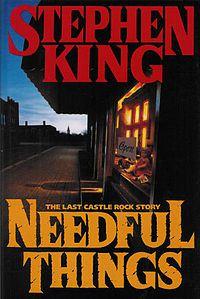
10. Needful Things (1991)
A classic “devil comes to town” tale, Needful Things has a “Young Goodman Brown” feel to it that also happens to be King’s last Castle Rock story. (Castle Rock being the fictional Maine town that serves as the setting for many King novels). The carnage begins when proprietor Leland Gaunt sets up the quaint shop of Needful Things in Castle Rock. At Needful Things all manner of curiosities are for sale…for a price. An intriguing tale that horrifies and captivates, the novel examines our over-attachment to material objects, everything from a Sandy Koufax baseball card to a purported piece of Noah’s Ark. Moreover, the novel details the delicate balance between man’s good and evil tendencies. It asks an age-old question: Is man inherently good or inherently evil? Since it’s a Stephen King novel you can probably guess the answer. Needful Things shows how quickly petty grievances can escalate into madness and violence. Gaunt proves to be one of King’s most fascinating villains, ranking right up there with Randall Flagg and Jack Torrance. Although the movie pales in comparison to the novel, Max Von Sydow’s Gaunt was perfect.
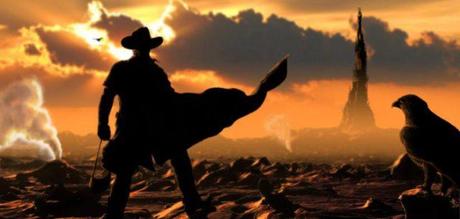
2. The Dark Tower series (The Gunslinger 1982, The Drawing of the Three 1987, The Waste Lands 1991, Wizard and Glass 1997, Wolves of the Calla 2003, Song of Susannah, The Dark Tower 2004, The Wind Through the Keyhole 2012)
Yes I know it’s technically eight novels but it’s my list my rules. Stephen King’s Lord of the Rings, The Dark Tower series follows the tale of Roland Deschain of Gilead, last in the line of gunslingers. Based loosely on Robert Browning’s epic poem, “Childe Roland to the Dark Tower Came,” Roland seeks the Dark Tower a nexus point in time and space that holds all of existence together. Roland’s enemy is the Crimson King, a creature who seeks to destroy the tower and bring all of existence crashing down. Joined by Ka-mates Eddie, Susannah, Jake, and Eddie, the Ka-Tet must reach the tower and perform some incredible final battle. Rarely can you call a piece of fiction a Magnum Opus, but Stephen King’s Dark Tower series is absolutely that. A story that’s ranged over four decades (King began the story in 1970) and spanned thousands of pages, it’s truly one of the most unique series you’ll ever read. A genre bending read, the series blends various elements of fantasy, horror, sci-fi, action, and of course the Western into a milkshake of awesomeness. While many people are still up in arms about the ending to the series, I thought it was appropriate.
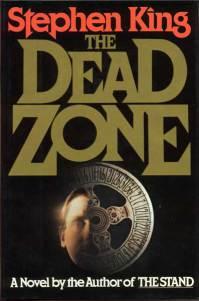
8. The Dead Zone (1979)
The Dead Zone is a an interesting Stephen King novel in that it’s one of the few books King ever used an outline for. Set against the backdrop of the 1970s, the story follows Johnny Smith, a high school English teacher who suffers a terrible car wreck that leaves him in a coma. Four and half years later, Johnny comes out of the coma only to discover he possesses psychic abilities. Touching certain objects in particular triggers powerful reactions. There’s just so much to love about this novel, whether it’s Johnny’s everyman persona or the almost rhythmic pace that doesn’t let up until the final pages. It also happens to be partially set in Castle Rock, where Johnny helps a local sheriff solve a series of grizzly murders. It’s easily the best part of The Dead Zone and one that David Cronenberg’s movie nailed. The book also ends up being the ultimate what-if-you-could-go-back-in-time-and-kill-Hitler tale, as Johnny must ultimately prevent a sleazy Congressman from becoming President and starting a nuclear war. While the ending is somewhat melodramatic, it in no way takes away from the novel as a whole.
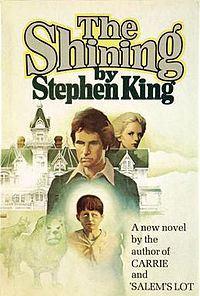
7. The Shining (1977)
When I ask other Stephen King fans what their favorite King novel is, I consistently get The Shining for an answer. Another one of King’s “psychic” novels, unlike The Dead Zone, this book follows focuses on five-year old Danny Torrance’s unique abilities or “the shine” as caretaker Dick Hallorann calls it. Furthermore, the Overlook Hotel is King’s homage to haunted house stories, with a heavy influence from Shirley Jackson. Except in this case it’s a hotel rather than a house. The novel strikes a delicate balance between Jack (Danny’s father and an alcoholic) and Danny but I always felt the more interesting of the two characters was Jack. There’s always been debate as to whether or not Jack was crazy or if the hotel was actually haunted. I think the answer is both. The inherent evil of the Overlook Hotel only exacerbates Jack’s descent into madness. I think this is why King has on numerous occasions publicly expressed his disdain for Kubrick’s film. Jack seemed to be mad from the start in the movie. While I think there is something to be said for King’s argument I can compartmentalize the two. Stanley Kubrick’s film is an excellent piece of cinema but I don’t think it adequately represents what is a far superior novel.
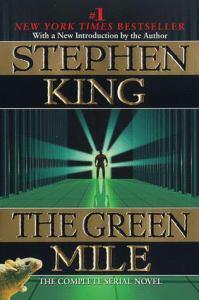
6. The Green Mile (1996)
King’s seminal novel about an innocent black man named John Coffey being condemned to death row for a crime he didn’t commit is a multi-faceted tour de force of fiction. Part mystery, part supernatural thriller, rarely has there been a character more sympathetic and loveable than John Coffey. My heart was crushed when narrator Paul Edgecombe was forced to electrocute Coffey even though Coffey asked him to. What resonates about The Green Mile nineteen years later is twofold. One is that King actually wrote this book in serial format delivered in six parts, something not seen on a consistent basis since the days of “Amazing Stories.” In fact King wrote a majority of one part during a rain delay at a Boston Red Sox game. I like writers who want to take risks and King is quoted as saying that he wanted to try a serial format novel just to prove to himself that he COULD do it. Furthermore, King’s novel really explores the pain of growing old especially when one lingers on for over a century like Edgecombe does. Cursed in many ways to watch his friends die while he lives on. Perhaps that is Paul’s ultimate punishment for letting Coffey die. The result is a bittersweet novel that I’m still very much in love with.
Check back soon for Part II!!!
You can follow me on Twitter as Darth Gandalf @cocook1978

